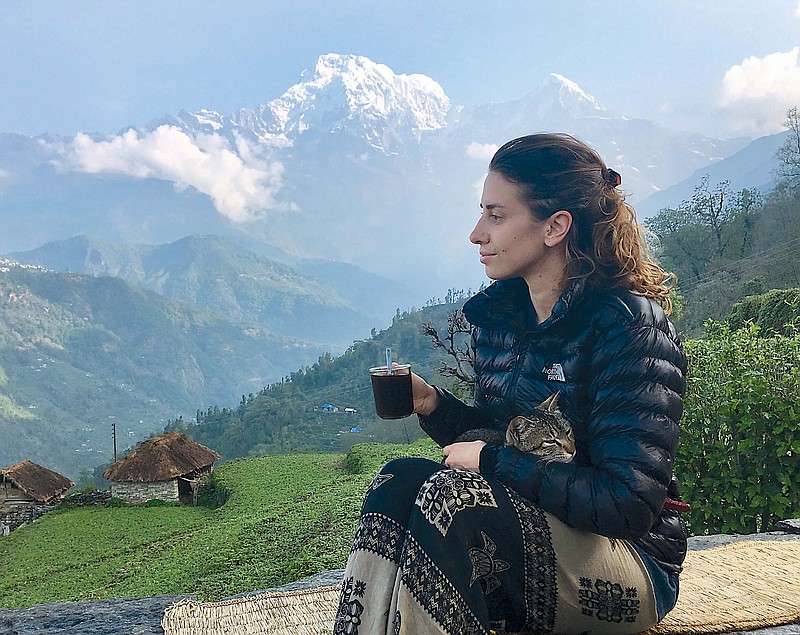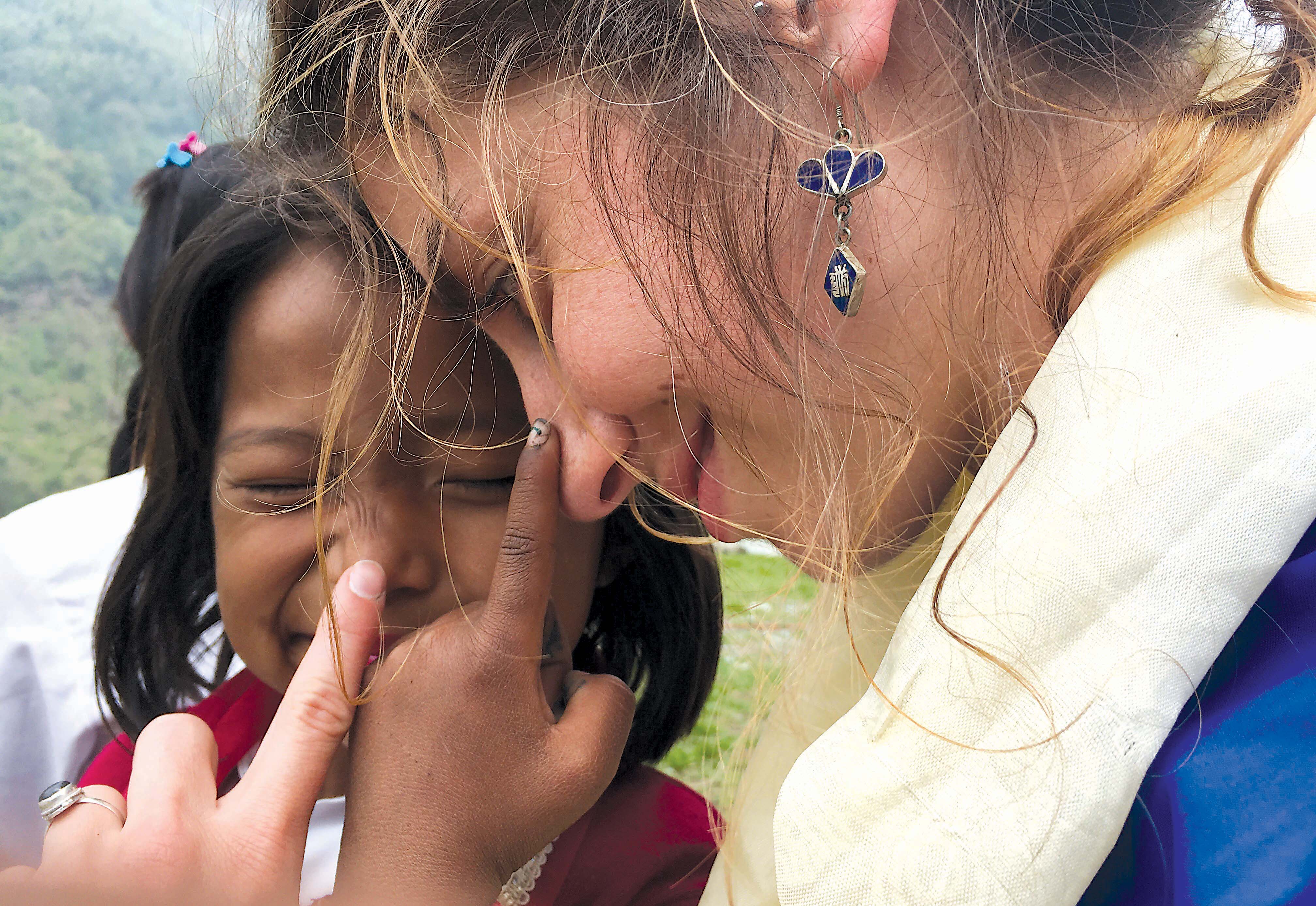The trek from Nayapul to the village of Tolka took six days. It included the crossing of Nepal's Annapurna mountain range, climbing 3,200 steep stone steps at Ghorepani Poon Hill and, finally, a two-day slog through the jungle.
As 25-year-old Chattanooga local Agatha Broyles and her fellow trekkers entered that jungle, a light rain began; then quickly became a deluge, complete with lightning and hail.
Soon, the party was knee-deep in water.
"I was covered in leeches, and as all this is happening, our guide turns and says, 'There are aggressive bears. We have to stay together!' I just started laughing. I was like 'What else?'" says Broyles.
But she wasn't too scared. This was, after all, the experience for which she'd signed up.
Broyles was raised to be an adventurer. She grew up on a sailboat, traveling "wherever Daddy wanted to go," she says. "We started in France, sailed around the Mediterranean; we went everywhere the coast met the ocean."
Her father is a mountaineer and hot air balloon pilot from West Virginia. Her mother, who hails from a poor neighborhood in Belo Horizonte, Brazil, embraced a more practical form of adventure.
"She worked her ass off to be the first person in her family to go to college. She saved up for years to come to the U.S.," Broyles says.
As a child, Broyles studied in France. She returned stateside as a teenager and attended high school in Memphis, Tennessee, followed by the University of Tennessee – Chattanooga, where she graduated last May with a degree in French and anthropology.
When it came to deciding her career path, Broyles knew only one thing: She wanted adventure and purpose.
"I wanted to do something important. I wanted to find something to pull out of me what I've felt was missing," Broyles says.
While researching opportunities, she discovered Trek to Teach.
Founded in 2011, Trek to Teach is a volunteer-based project that brings English-speaking teachers to schools in remote Himalayan villages for stints of 10 weeks up to the full eight-month school year. Located along popular backpacking routes, these villages' economies largely depend on English-speaking hikers. Trek to Teach's idea is to better equip Nepali children with English language skills and an understanding of the Western world so they can take advantage of that tourism market.
When Broyles applied to the program in 2016, it was still relatively new. Since its inception in 2011, Trek to Teach has received only 200 applicants. This past April, Broyles was the 18th volunteer accepted into the program.
"They told me, 'We're going to need you to be very flexible. Don't have any expectations. We're still figuring it out,'" says Broyles - who was hired as an English teacher but would also become a science, art and health teacher for 140 children in grades 1-6, none of whom spoke a word of English.
In fact, nobody in the village did.
"I thought the trek was going to be the hard part," Broyles says.
After her guide left her at Tolka, Broyles was utterly alone, immersed in a language and culture unlike her own. Moreover, she had arrived during peak tourist season, meaning the villagers' homes, which doubled as hostels for backpackers, were full. Broyles, along with many of the natives, had to sleep in a tent amid the mountain town's unpredictable weather, which alternated between hot days, rain showers, snow showers and sudden hail storms.
And the water filter Broyles had brought with her broke during the trek, so she had to drink questionable water.
"I have diarrhea. I'm throwing up. I'm sleeping outside and I have to get up and go to the bathroom all night. I was like, this is it. I'm dying," she says.
She finally started to get scared.
"I had to look myself in the mirror every morning and say, 'OK, you're not going to have a panic attack. You've got this.' Every day I had to find a stronger version of myself to get through the day," Broyles says.
The classroom posed its own set of tribulations. The native-speaking teachers often didn't show up, and Broyles says the children were unruly and she frequently had to break up fist fights, let alone that none of the kids spoke English.
"A lot of them had really bad home lives," Broyles says. "They were very, very poor."
Her students would show up to class without shoes or underwear. Some had never even seen a toothbrush. Broyles happened to score a bundle of toothbrushes and toothpaste from a backpacker and brought the toiletries to school for a hygiene lesson. She led the children over to the faucet jutting out from the wall over a concrete slab and demonstrated brushing motions while singing, "Brush, brush, brush your teeth."
"And the kids would try to sing it back. It was so cute," says Broyles, who hoped that despite the language barrier, her students would remember and follow through with the action.
Eventually, Broyles picked up a few key Nepali expressions, helping her manage the classroom. For example, "basnus," which means "sit down;" "eia chin" which means "wait a second;" and "chak chak gan hoina," which means "don't be bad."
She also took a personal interest in the students themselves. She began to follow her students home after class. This is how she discovered that a few of the children trekked three hours each way, every day, to class. Another child, she learned, lived in a chicken coop with his family.
"I wanted to understand my kids. I wanted to know why they acted out and were so aggressive in school," Broyles says.
One morning, Broyles awoke at her hostel and found an 11-year-old boy sleeping in the garden. She tried to befriend the boy. At first, he was shy, but soon, Broyles says, he started to follow her, and eventually he followed her to school.
"I put him in a fourth-grade class and then he was there every day. He was a great student," Broyles says.
Broyles was supposed to teach in Tolka for three months. However, the school closed for the season after two, for reasons unclear to Broyles since she did not understand the language.
In late June, she said goodbye to the villagers and her students and began the trek home, hoping that at least a few of her lessons would leave a lasting impression on the children.
"I don't feel like I changed their lives," Broyles says. "I think I made it a little easier for them while I was there. I paid them attention. I took an interest."
The experience, however, did change Broyles.
She had found her adventure, her purpose and that missing part of herself.
"I do feel like my calling is to work with kids who have hard upbringings," she says. "When I looked at those kids, they would look back at me and I'd see that version of myself that I'd always wanted to find."

